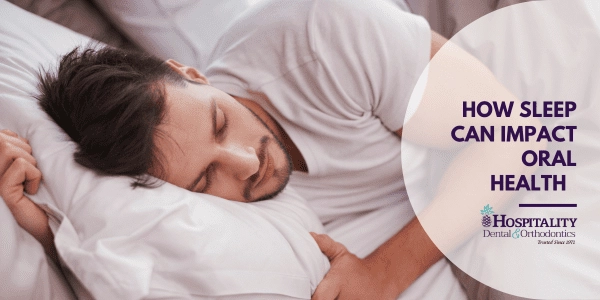
The Centers for Disease Control has identified sleep deprivation as a public health crisis, with somewhere between 50 and 70 million Americans experiencing sleep disorders or disruptions that can threaten their health and safety.
When someone is experiencing chronic or prolonged sleep difficulties, not too many people know that dentists and hygienists may be some of the first people to notice, since sleep can have a huge impact on oral health.
Your sleep is considered disordered if you have difficulty doing any of the following:
- Falling asleep
- Staying Asleep
- Cycling through all four stages of sleep
- N1: Your mind and body start to relax, but you’re still easily woken.
- N2: You’re relaxed and unaware of your surroundings.
- N3: Your blood pressure drops and your sleep is deep, difficult to wake.
- Rapid Eye Movement (REM): Your brain activity is high as you dream and your mind and body rejuvenate for the coming day.
Sleep apnea is the most common sleep condition, with approximately 39 million U.S adults experiencing obstructive sleep apnea. In the past, the condition was primarily identified in adult males, but growing numbers of women and children are also being diagnosed. In fact, strong correlations have been discovered between certain oral malformations in newborns and children that lead to the development of sleep apnea in adulthood.
Unfortunately, the list of negative impacts that can result from sleep disorders, including sleep apnea, is a long one.
Inflammation:
The immune system weakens when it’s sleep deprived, and when the seeds of gingivitis and periodontitis emerge, those infections are more likely to take hold.
Tooth Decay:
People experiencing sleep disorders often experience acid reflux at night, and stomach acid wears away at enamel and leads to cavities.
Wear and Tear:
Mouth breathing associated with certain disorders can lead to dry mouth, plaque buildup, and tooth decay, eating away at the tooth enamel. The heightened stress associated with sleep disorders can also lead to bruxism (grinding) that wears down the teeth and their enamel.
TMD:
Chronic sleep disorders can worsen temporomandibular joint pain and dysfunction due to muscle tension and clenching.
One way to be vigilant about your oral health is to look out for signs of a sleep disorder. These include:
- Snoring most or every time you sleep
- Waking up with a headache or jaw pain
- Waking up with a dry mouth or sore throat
- Waking up feeling tired and lasting all-day
Any of these symptoms should be shared with your dental care provider. The good news is, the ADA recognizes the impact of sleep health on oral health, and they have directed dentists to screen for sleep-related breathing disorders as part of patient examinations.
Your dentist will look for the following signs of a sleep disorder:
- Appearance: An unkempt appearance, irritability, falling asleep in the chair, or a lack of focus could be contributing factors in a dentist’s sleep disorder referral to a primary care physician.
- Grinding: They will look for signs of the wear and tear that result from nighttime grinding.
- Structures: Prolonged sleep deprivation can actually change the appearance of your facial features, and this might be most evident to your dentist.
Seeing your dentist regularly can be a key tool in identifying a sleep disorder before it permanently damages your teeth or hurts your health in other ways because they are able to track changes over time. In California? Make an appointment today.
